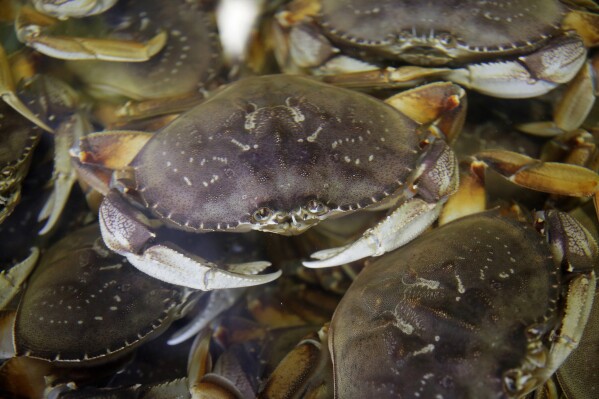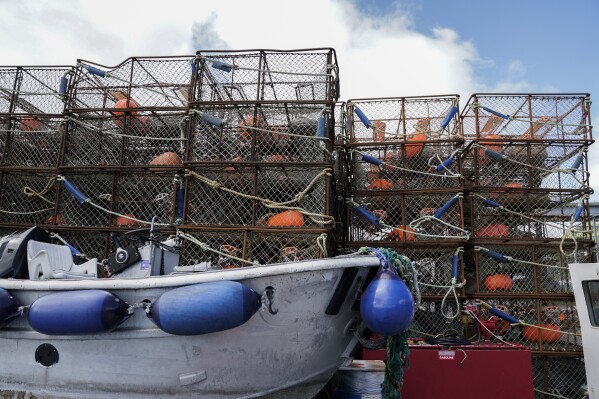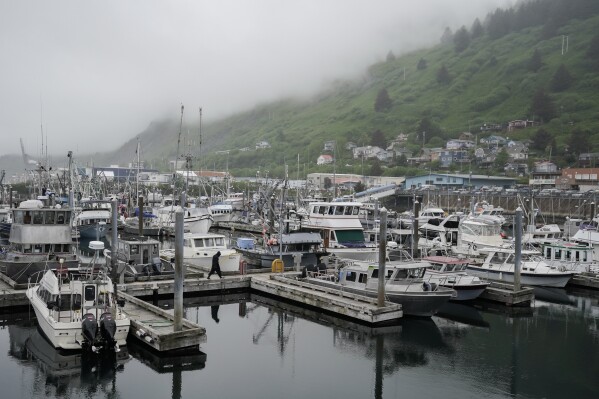Harvest of horseshoe crabs, used for medicine and bait, to be limited to protect rare bird
PORTLAND, Maine (AP) — Interstate fishing regulators are limiting the harvest of a primordial species of invertebrate to try to help rebuild its population and aid a threatened species of bird.
Fishermen harvest horseshoe crabs on the East Coast for use as bait and in biomedical products. The animals are declining in some of their range, and they’re critically important as a food source for the red knot, a migratory shorebird listed as threatened under the Endangered Species Act.
The regulatory Atlantic States Marine Fisheries Commission said it will allow no harvest of female horseshoe crabs that originate in the Delaware Bay during the 2024 fishing season. The Delaware Bay is one of the most important ecosystems for the crabs, which are also harvested in large numbers in New England.
The Delaware Bay horseshoe crab population has been increasing over the last two decades, which is an encouraging sign, said John Clark, chair of the Atlantic States horseshoe crab management board. Still, shutting down the female harvest will help the red knot, which relies on crab eggs to refuel during its long migration, Clark said.
 California’s commercial Dungeness crab season delayed for the sixth year in a row to protect whales
California’s commercial Dungeness crab season delayed for the sixth year in a row to protect whales
 Alaska fishermen will be allowed to harvest lucrative red king crab in the Bering Sea
Alaska fishermen will be allowed to harvest lucrative red king crab in the Bering Sea
 Alaskan fishers fear another bleak season as crab populations dwindle in warming waters
Alaskan fishers fear another bleak season as crab populations dwindle in warming waters
“Despite this positive finding, the board elected to implement zero female horseshoe crab harvest for the 2024 season as a conservative measure, considering continued public concern about the status of the red knot population in the Delaware Bay,” Clark said.
The board said it would allow more harvest of male horseshoe crabs in the mid-Atlantic to help make up for the lost harvest of females.
The crabs are used as bait for eels and sea snails. Their blue blood is also used to test for potentially dangerous impurities by drug and medical device makers. The animals are harvested from Maine to Florida and have lived in the ocean environment for more than 400 years.
Environmental groups have called for greater protection of horseshoe crabs in recent years, and have scored some wins. The federal government announced in August it was s hutting down the harvest of the species in Cape Romain National Wildlife Refuge in South Carolina during the spawning season.
Ben Prater, southeast program director for Defenders of Wildlife, said at the time that the move was important for “migratory shorebirds that count on the horseshoe crab eggs to fuel their long journeys.”
Disclaimer: The copyright of this article belongs to the original author. Reposting this article is solely for the purpose of information dissemination and does not constitute any investment advice. If there is any infringement, please contact us immediately. We will make corrections or deletions as necessary. Thank you.




